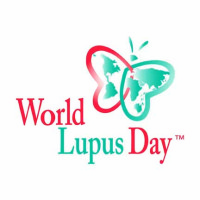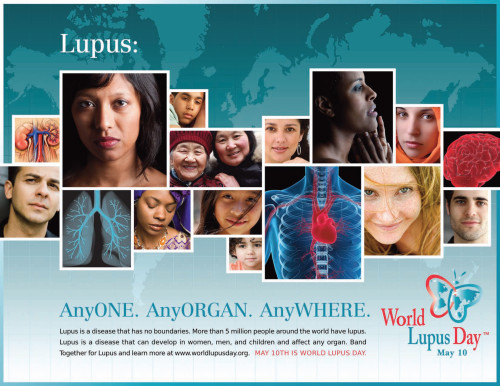World Lupus Day 2015
 It’s that time of year again when I reflect on having lupus, on both how it sucks and how lucky I am compared with many other sufferers. I am aware every day of having lupus, of the effect it has on my life, of the constraints and limits it places on me, but also of the many common lupus symptoms I don’t suffer.
It’s that time of year again when I reflect on having lupus, on both how it sucks and how lucky I am compared with many other sufferers. I am aware every day of having lupus, of the effect it has on my life, of the constraints and limits it places on me, but also of the many common lupus symptoms I don’t suffer.
I was diagnosed with systemic lupus erythematosus in 2007 after about a year and a half of tests and investigations into why I was so tired all the time. After diagnosis I realised that there had been other symptoms too that pointed to lupus, but it hadn’t occurred to me they were abnormal. By that I mean things like having cold hands and feet all the time (a sign of poor circulation), dry mouth and eyes, flu-like symptoms such as muscle aches. And there were things I didn’t put together until after diagnosis: exposure to sunlight makes me headachy, dizzy and nauseous far faster than sunstroke would, and strong sunlight brings me out in a rash before it burns me.
So diagnosis solved more mysteries than I knew I had to solve. It also, of course, brought targeted doctor’s advice and treatment. I take aspirin daily, which thins my blood and prevents those frequent headaches. I wear SPF50 sun lotion for more than half the year and in midsummer that’s still not enough, so I hide indoors when everyone else is out there soaking up the rare moments of British sunshine. When I went through a bad patch a few years back I took steroids and a physio helped me work on a routine of exercises so that even at my lowest energy levels I make sure that I do some exercise every day, so that I don’t fall into the spiral of being less fit meaning I have less energy meaning I do less exercise meaning I get less fit…
Which all means that my life is basically fine, no better or worse than most people’s as long as I take my aspirin and wear my sun cream. That’s a fantastic, huge improvement that I am very grateful for and I am in this position because I saw the right doctor who had the right idea of what to test for. (Basically, my GP referred me to a haematologist who referred me to a rheumatologist who happened to specialise in lupus. There were several other doctors along the way, but I still think I got lucky.) Lupus isn’t straightforward to diagnose because the symptoms are so varied, but it really helps if doctors are aware of it.

That’s why World Lupus Day is so important. By raising awareness of lupus, we can help doctors to think of it when they see a patient whose symptoms are a fit. We can raise money to send out information to doctors about what to look for. And of course we can all learn how to help those in our lives who have lupus. Because while not common, it’s also not a rare disease – about 50,000 people have it in the UK, for example.
What should you do if you have a friend or family member with lupus? Well obviously they will have their own thoughts but here are a few of my own:
- Bear in mind that for the most part lupus is an invisible disease – there are no obvious outward signs that the person is in pain or exhausted or both, but that doesn’t mean they’re not.
- Try not to be impatient with them always having to turn down invitations or cancel plans they have made. Lupus is limiting and fatigue is very real. To understand this better, try reading the excellent Spoon Theory. Please keep trying to include us, we appreciate it!
- Do talk about it. There’s nothing shameful about having lupus, and when it’s the direct reason for a person’s way of life (the hours and type of work they do, the exercise and leisure activities they take part in) it’s kinda weird not to ever talk about it.
Thank you for sharing this information about this disease.
readerbuzz.blogspot.com
I didn’t knew Lupus had those symptoms, thank you for sharing.